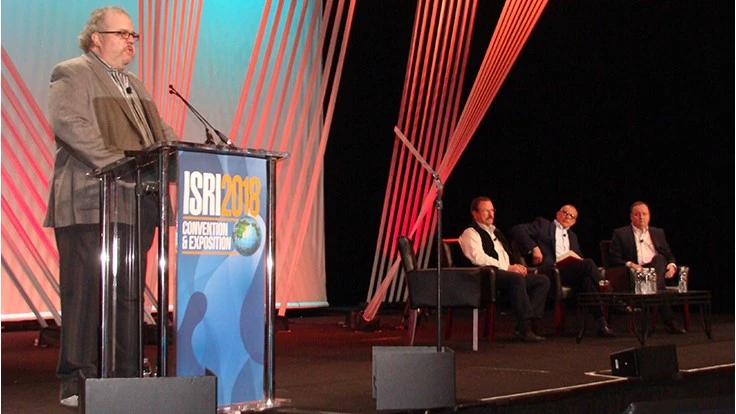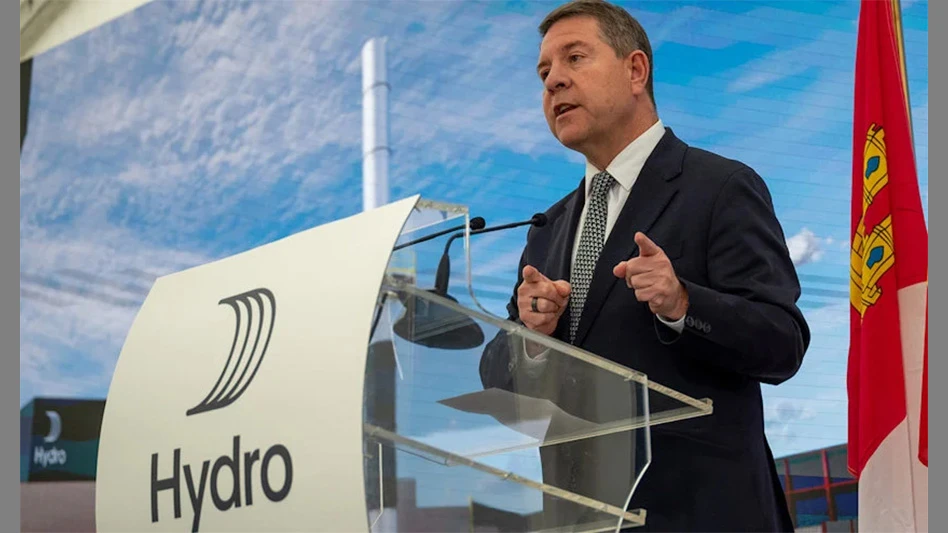
Above, from left: moderator Randy Goodman of Greenland (America) Inc. and panelists
Tim Strelitz of California Metal-X, Ed Meir of INTL FCStone and Joe Pickard of ISRI.
The trade turmoil that has rocked the recycling world also has led to a question of opportunity: Is the time right for the return of a large-scale secondary copper refinery in the United States? The question was among several discussed at the Copper Spotlight session at the ISRI2018 convention, held in Las Vegas in mid-April and hosted by the Washington-based Institute of Scrap Recycling Industries (ISRI).
Panelist Tim Strelitz, president of California Metal-X, said his family built a red metals ingot production plant in Los Angeles in 1979 “in a business that was about to collapse in a state that was about to go stupid.” Strelitz tied the collapse of secondary copper refining in the U.S. in part to a national trade policy approved by a Congress “that was paid off by large companies in our country to move manufacturing offshore [to] give American consumers a couple of bucks off a T-shirt.”
When it comes to a new secondary copper refinery in the U.S., ISRI Director of Commodities Joe Pickard remarked that “costs and regulatory burdens are quite high” in the U.S., but because those regulations are in place and “you’ve got law and order” in the U.S., investors may be attracted to the notion.
Ed Meir, an analyst with INTL FCStone, also noted that “regulatory oversight had been lagging” in China, but the nation’s government appears to be closing that gap. During the past 20 years, however, “Our technology is old here, and China has an edge.”
Strelitz said the way to close that technology gap is with one or more investments in new refineries. “I think a secondary copper smelter is absolutely vital to the good and welfare of the U.S.,” he remarked. He commented that Spain, Belgium and Germany have such refineries or smelters, “and their regulations are just as tough.”
Added Strelitz, “There is no reason why it can’t be done, if somebody wants to make good money.” He also commented that the last large secondary refinery in the U.S., the Chemetco facility in Illinois that closed in 2001, could still be operating if not for questionable management decisions that doomed it to become a Superfund site.
The panel also discussed the potential future growth of wire chopping in the U.S., with Strelitz contending buyers in China had long been “overpaying” for wire and cable scrap. Meir replied, “That’s the market; that’s what they’re paying.”
Strelitz expressed reservations that U.S. companies may invest in new chopping capacity, “but then two years later, China decides to [get back into the market] and pay 70 cents above [terminal pricing] for wire. The area we need to concentrate on is fair trade. That means not overpaying.”
In the current domestic copper scrap environment, Pickard pointed to the scarcity of good workers and transportation shortcomings as concerns in the sector. “Finding trucks and rail cars in some semblance of good time” is a widespread complaint among ISRI members, he commented.
Moderator Randy Goodman of Atlanta-based Greenland (America) Inc. said on the ocean shipping front, delays caused by inspections at Chinese ports are “tremendous,” leading to “weeks and weeks of backlog.” He remarked that the scrutiny was occurring at all ports, whereas “it used to be the wild, wild west the farther you got from Beijing.”
Sponsored Content
Labor that Works
With 25 years of experience, Leadpoint delivers cost-effective workforce solutions tailored to your needs. We handle the recruiting, hiring, training, and onboarding to deliver stable, productive, and safety-focused teams. Our commitment to safety and quality ensures peace of mind with a reliable workforce that helps you achieve your goals.
ISRI2018 was April 14-19 at the Mandalay Bay Resort & Casino in Las Vegas.
Get curated news on YOUR industry.
Enter your email to receive our newsletters.
Latest from Recycling Today
- Toppoint Holdings expands chassis fleet
- Lego creates miniature tire recycling market
- Lux Research webinar examines chemical recycling timetables
- Plastics producer tracks pulse of wire recycling market
- Republic Services, Blue Polymers open Indianapolis recycling complex
- Altilium produces EV battery cells using recycled materials
- Brightmark enters subsidiaries of Indiana recycling facility into Chapter 11
- Freepoint Eco-Systems receives $50M loan for plastics recycling facility








